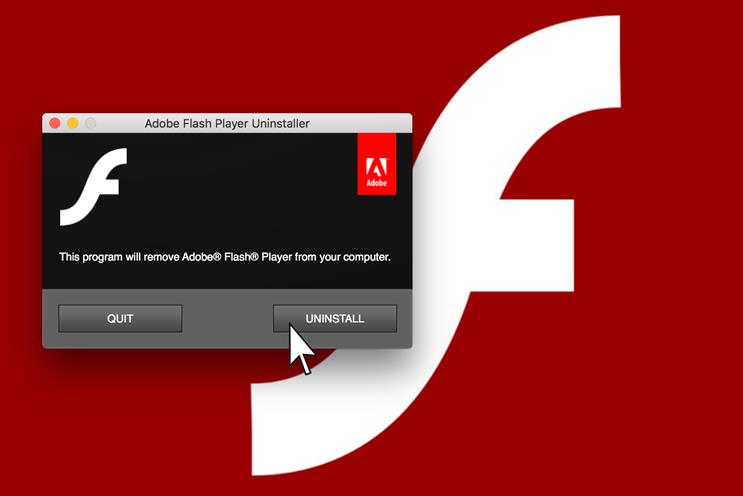…the absolute and vitriolic hatred of Flash. Flash is buggy, leaks memory and causes crashes. It’s a security risk (an open back door for hackers); isn’t searchable by Google; requires a plug-in; chews battery power on laptops and mobiles; and is constantly nagging the user to upgrade. Oh, and Steve Jobs wrote a letter about how much he hated it.
So when Adobe announced recently that it would be officially killing Flash in 2020, I swear I actually felt the breeze generated by the developer community’s collective fist pump. Only, I wasn’t one of them. Today’s society doesn’t do nuance well but, in this case, it’s missing the entire point. Let me explain.
First of all, let’s go back to 1996 when Flash (or FutureSplash Animator, as it was then) was born. I was 25. At the start of that year, the internet only had 16 million users and they spent less than one minute a day "surfing". Most of those did it via AOL.com, which came as a CD-Rom on the front of a magazine. Broadband wasn’t a thing, Google was still two years away from being founded, Apple was making a loss of $1bn a year and that Nokia Snake game hadn’t even been invented. The internet wasn’t a fun place. It wasn’t a million miles away from a visual database and was maintained by programmers. I know – I was there.
Flash brought creative water to the internet desert of the late 1990s
Then came Flash. It had a quirky programming language and real programmers laughed at it. However, designers with a digital twinkle in their eye (like me) were drawn to it like moths to a candle. It allowed their bonkers visions to come to life in front of an instant global audience. Bedroom creators churned out endless streams of games, animations, digital curiosities and creative knick-knacks. Entire immersive websites were made in Flash. It powered the world’s hunger for streaming video (aka YouTube) and online gaming. It allowed children to learn by interacting with subjects rather than just watching VHS cassettes. In short, Flash brought creative water to the internet desert of the late 1990s.
Still the developers ignored it. It was a folly and certainly not a threat. They still had all the important database and HTML stuff to do. Things remained pretty much like that until 2007, when Adobe bought Flash and updated its programming language. It instantly became a developer’s frenemy and they started to jump over the fence, bringing their skills with them. That’s where the beginning of the end started.
Those developers brought structure, processes and, dare I say, actual knowledge to the happy-clappy Flash community. Coding became complicated – so complicated that, suddenly, creatives needed a "coder mate" to get anything done. Creatives were left impotent and dependent in the brave new world of Flash.
Like a gang of youths disrespectfully jeering at an old person on the bus, it’s easy for developers to poke a digital finger at Flash and laugh
The new world demanded open standards – something Flash wasn’t. Soon, the folk scoping the projects sidelined it and, in a relatively swift hostile takeover, Flash was made the villain.
What followed was both brilliant and sad. Brilliant in that the world had moved on and it demanded interfaces, sites and experiences that worked for everyone, across multiple devices and were open and accessible. Flash simply had to go. Yet it was sad as it made the internet that little bit less colourful, less fun and less easy for anyone to express their creativity.
Like a gang of youths disrespectfully jeering at an old person on the bus, it’s easy for developers to poke a digital finger at Flash and laugh. Lest we forget the Herculean job Flash did of transforming the internet and recruiting creative minds at a time when it was so dull. It’s still the main rich-content delivery platform of choice for the out-of-home industry, so be careful assuming it’s universally useless today.
One could argue we are seeing shades of the same hostile takeover happening between the general public and the internet itself. Artificial intelligence, tracking, programmatic, Bitcoin, the dark web, hacking, even artificial and virtual reality are making many feel that the internet is owned by someone else, somebody smarter and more organised than them, somebody making the important decisions.
Just like Flash, our current internet will be judged by the future on rules we cannot yet foresee. Activities we enjoy now will be deemed inappropriate or inefficient. Others will be new, exciting and reflect the technology, society and needs of the time. So go easy on Flash. Sure, it’s been painful of late, but we wouldn’t be here without it. When it finally goes, I’ll be raising a shot of virtual Jägermeister, shedding a virtual tear and deleting it before it crashes my damn browser. Again.
Dino Burbidge is the director of technology and innovation at WCRS


